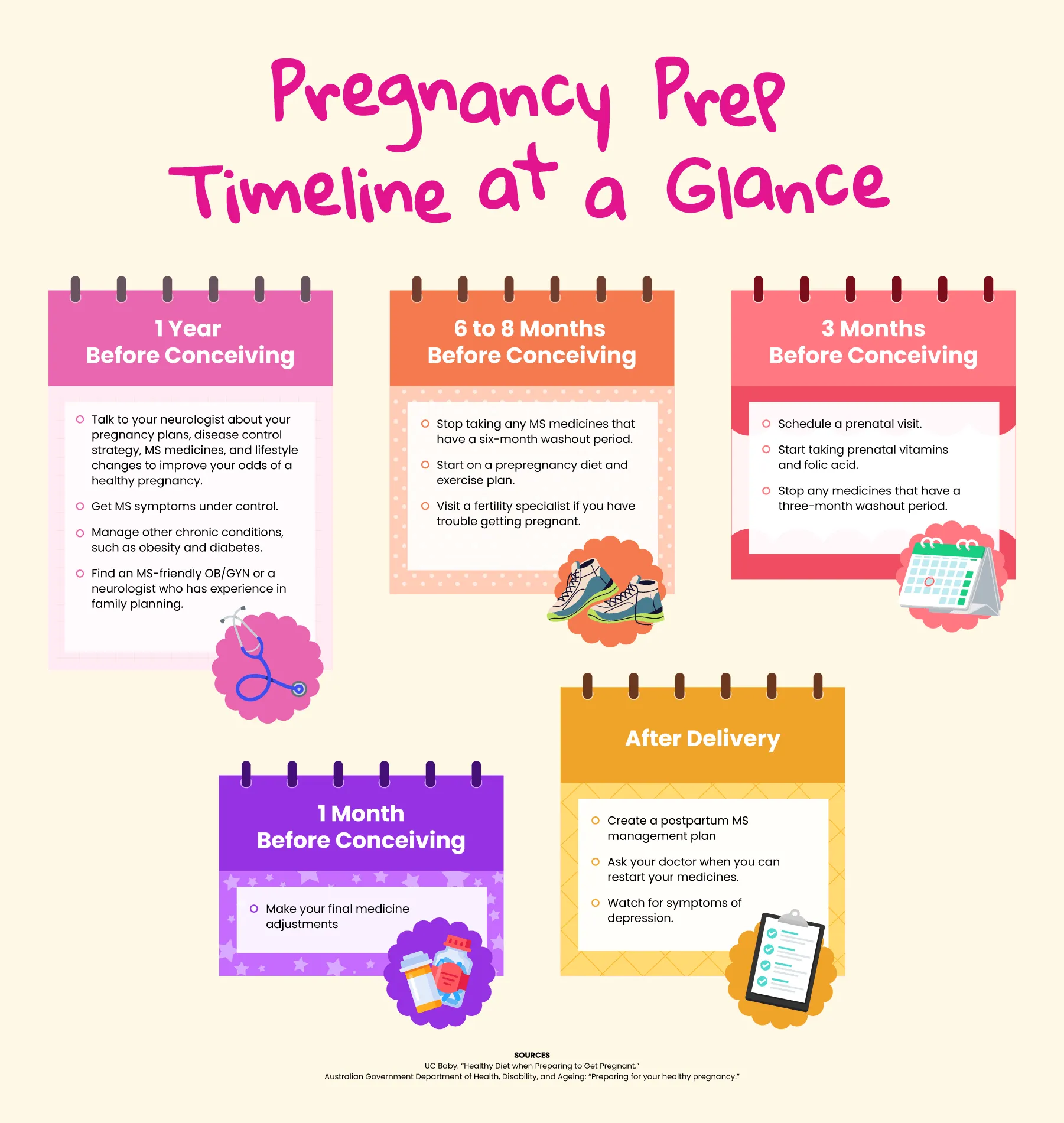Can I Have a Healthy Pregnancy with MS?
Multiple sclerosis (MS) symptoms such as fatigue, weakness, and numbness can affect many parts of your life. If you want to start a family now or in the future, you might wonder how this chronic condition might affect your chance of conceiving.
MS shouldn't stop you from having children — if that's your goal. People with this condition are just as likely to have a healthy pregnancy as those without it. MS doesn't raise the risk of complications like miscarriage, premature birth, and birth defects.
Pregnancy also shouldn't make MS worse. In fact, you might even get a break from symptoms. "Pregnancy may exert a short-term beneficial effect on the course of MS, including fewer, less severe relapses, especially in the third trimester," says Anushka Chelliah, MD, a board-certified maternal-fetal medicine specialist at Pediatrix Medical Group in Houston, Texas.
There are things you can do, with your doctor's help, to make sure that you and your baby are healthy. Follow this timeline to get ready for pregnancy and delivery.

1 Year Before Conceiving
Talk to your neurologist
The sooner you have this conversation, the better. Topics to discuss include:
- Your pregnancy plans
- Your long-term disease control strategy
- Whether your MS medicines are safe during pregnancy
- Lifestyle changes that can improve your odds of a healthy pregnancy
- Vaccines you may need before you conceive
"There should also be a focus on optimizing any chronic conditions, such as hypertension [high blood pressure], diabetes, weight, and environmental factors," says Chelliah.
See a family planning specialist
Not every neurologist has experience in family planning. If yours doesn't, they can refer you to someone in the NEUrologists Advancing Women's Health, Reproduction, and Innovation Group (NEU-RING). These doctors have specialized training in reproductive health. Or you can look for an MS-friendly OB/GYN.
Get your symptoms under control
The best approach to pregnancy with MS is to have your disease under control early. "We recommend that those considering pregnancy are stable and disease activity and relapse-free for one year prior to pregnancy," says Claire S. Riley, MD, a neurologist and director of the Columbia University Multiple Sclerosis Center. "Stable" means you have no new symptoms or signs of lesions on MRI.
6 to 8 Months Before Conceiving
Tweak MS medicines
Now is the time for another medicine review with your neurologist. Disease-modifying therapies (DMTs) slow the progression of MS, prevent relapses, and lessen nerve damage. But many of them aren't safe for a growing baby. Your doctor will weigh the benefits of the medicine for controlling MS against the risks to your pregnancy when considering whether to keep you on it.
Many DMTs require a washout period. It means you have to stop taking the drug for a certain amount of time before you get pregnant, to allow it to fully leave your body. The washout period for each type of drug is different. You may need to stop taking alemtuzumab (Lemtrada) and cladribine (Mavenclad) as early as six months before you try to conceive.
As you decide to come off MS medicines, consider both your pregnancy and the postpartum period. You may have different medication options available if you plan to breastfeed, says Riley.
Start on a prepregnancy diet and exercise plan
A healthy diet is always important during pregnancy, but especially when you have MS. Ask your doctor or a dietitian which foods to focus on during those nine months.
Two nutrients you may want to add are omega-3 fatty acids and vitamin D. Some studies showed that babies born to mothers with MS were small for their age. Omega-3 fatty acids from foods such as walnuts, fish, and flaxseeds might improve the chance that your baby is born at a healthy weight. Vitamin D — found in milk, yogurt, and fortified cereals and orange juice — helps reduce a baby's risk for MS.
Regular exercise will help you maintain muscle strength during pregnancy. A physical therapist can recommend a fitness program that's safe for you.
Visit a fertility specialist (if you need help conceiving)
MS shouldn't make it harder to get pregnant. But since around 13% of women overall have trouble conceiving, it's worth talking to a doctor about — especially if infertility runs in your family.
In general, doctors suggest that you see a fertility specialist after you've tried to conceive for 12 months. But if you have MS, you should see a specialist after just six months of trying. You may want to start even earlier if you have close family members with infertility.
3 Months Before Getting Pregnant
Schedule a prenatal visit
Don't wait until you learn that you're pregnant to consult an OB/GYN. Start early. The doctor will let you know if you need any special medical care to prepare for pregnancy.
Start prenatal vitamins and folic acid
Prenatal vitamins are essential for any healthy pregnancy. They include nutrients like iron, calcium, and vitamin D to support you and your growing baby. Folic acid helps your baby's brain and spine develop.
Recommendations are the same for any pregnancy, with or without MS. Start prenatal vitamins and folic acid about three months before you plan to get pregnant. Your doctor might also recommend that you take vitamin D supplements to lower your child's risk for MS.
Stop taking medicines with a three-month washout period
You'll need to start the washout period for the S1P modulators fingolimod (Gilenya) and ozanimod (Zeposia) around three months before you conceive, to fully get them out of your system. B cell-depleting drugs like ofatumumab (Kesimpta), ocrelizumab (Ocrevus), and rituximab (Rituxan) are safe to take up to one to three months before you get pregnant.
1 Month Before Getting Pregnant
Make your final medicine adjustments
In these last few weeks, check in again with your doctor to find out which medicines you need to stop. You'll need to go off dimethyl fumarate (Tecfidera), diroximel fumarate (Vumerity), ponesimod (Ponvory), and siponimod (Mayzent) a week or two before you conceive. "Confirm with your neurologist when [the medicine] will be gone from your system," says Chelliah. Also ask about other, non-MS medicines that could be risky to take while you're pregnant.
After Delivery
Create a postpartum MS management plan
You may have gotten a break from MS symptoms in the last three months of pregnancy. But during the three months after delivering, up to 30% of new moms relapse. Work with your neurologist on a postpartum plan to manage relapses, which may include restarting the medication you used to take or starting a new one. Office visits, blood tests, and MRIs can be part of checking you for a relapse.
Discuss when to restart your medicines if you plan to nurse your baby. (Breastfeeding may protect you from relapses.) Some medicines are safe to take while you breastfeed. Others aren't safe for your baby. You may have to wait two to four weeks postpartum to restart your MS medicine. If you don't breastfeed, you can go back on it soon after you deliver.
Watch for depression
Postpartum depression is common in new moms, but the risk is even higher in those with MS. If you have symptoms like sadness, anxiety, hopelessness, and insomnia that don't improve within a few weeks after your baby's birth, see a mental health care provider for help.


